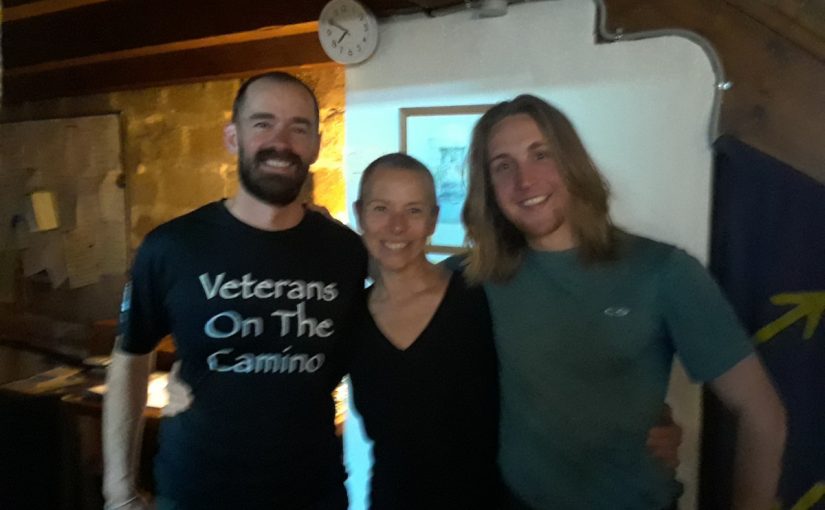I always scanned my guidebook in the evening between glasses of wine that taste like the waterlogged red soil we walked by and the makeshift dinners of beer and sandwiches or spaghetti and wine in the hostels. San Juan Bautista in Grañon had a little pink heart beside the name so I thought we ought to check it out. All I knew was that it was connected to a church and (according to the book) run by nuns. So when Sara and I chased the yellow arrows and sparse blue-yellow signs down the narrow cobbled streets around the church to an ancient and thick wooden door sunken into the ground and flush with a stone step and the gray bricks of the church I was confused and hesitated before striking the iron handle to announce our presence. I expected a nun in full habit garb to pounce forth, ruler in hand and separate men and women into different dorms before making us kneel on cement floors before a silent supper. So I carefully replaced the old fashioned door bell and asked Sara if this was what we should really do. She struck the cold iron twice and we both stood back.
No one answered and I shoved the door inwards. We were in the dark bowels of the church and it reeked of wet shoes and stagnant water. We wound our way up the narrow stone stairs and through two more sets of doors. The other side was not what I expected.
Lola and Beatrice reminded me of the vague compilation of assumptions about adulthood I developed as a child going to sing-alongs with my parents, right down the warped wood floors in their living room and the heavy smell of incense and woodsmoke and lentils. No one had habits or rulers and Sara and I greeted everyone together. We threw down thin mattresses on the floor in the empty sleeping room and joined a the jovial prelude to dinner; Beatrice and a stylish frenchman singing, a smattering of jokes in different languages and laughter.
We devoured lentil soup rich with spice and garlic and a salad (vegetables are a rare treat in spain) and Beatrice and Lola snuck off into the kitchen and retrieved four large tubs for washing and rinsing dishes, along with a stack of dry clothes, placing them on the table and beginning a ruckus chorus of songs that bounced between Spanish and French, English and Italian and back again. With a mischievous smile Lola ushered us away from the table and the clean dishes, down and away from the warmth of the wood floors and stairs, through the double doors and around the cold stone steps that wound into the room with packs and wet socks and mattresses and through a small portal in an unnoticed corner.
Someone started building this church and this room, knowing they would die before they would ever get to stand in the spacious silence beneath the tree-like stone columns or kneel before the golden alter. Thirty five of us tired and well fed peregrinos stood in the choir room at the foot of the cross of the church, up the stairs from the pews, surrounded by the deep red thrones that lined the walls. I think it would be impossible to walk this way, or stand in this church, if you did not believe in something that was bigger than yourself.
We passed a candle around and said what we were thankful for. I watched strangers cry and open up in languages that I did not understand. I know that they thanked God, that they mourned people who died and thanked the people that were still there. I held the candle with both hands and thanked Jesus for the first time in my life. He was at the head of the church, at the top of the alter, nailed to the Roman boards, and in an odd way he brought us all together. He brought my parents together thirty some years ago and compelled all of these people to walk across a country and eat lentils together.
I hugged everyone in that room and thanked Beatrice and Lola.

Thanks for bringing these memories in my mind, had the goosebumps reading it. The moment when many people in that dark room made peace with God. The most incredible and inexplicable miracle of the Camino. Ultreya!